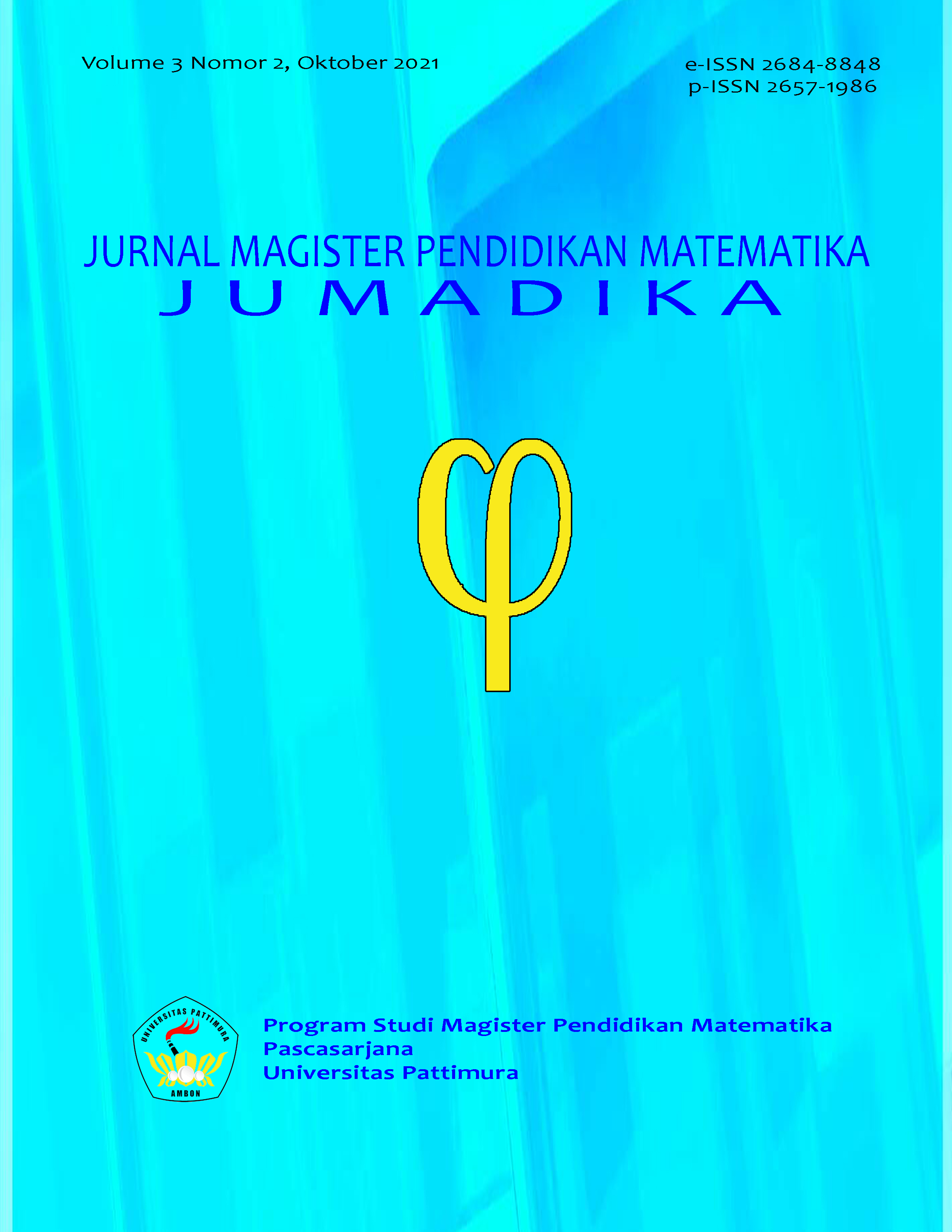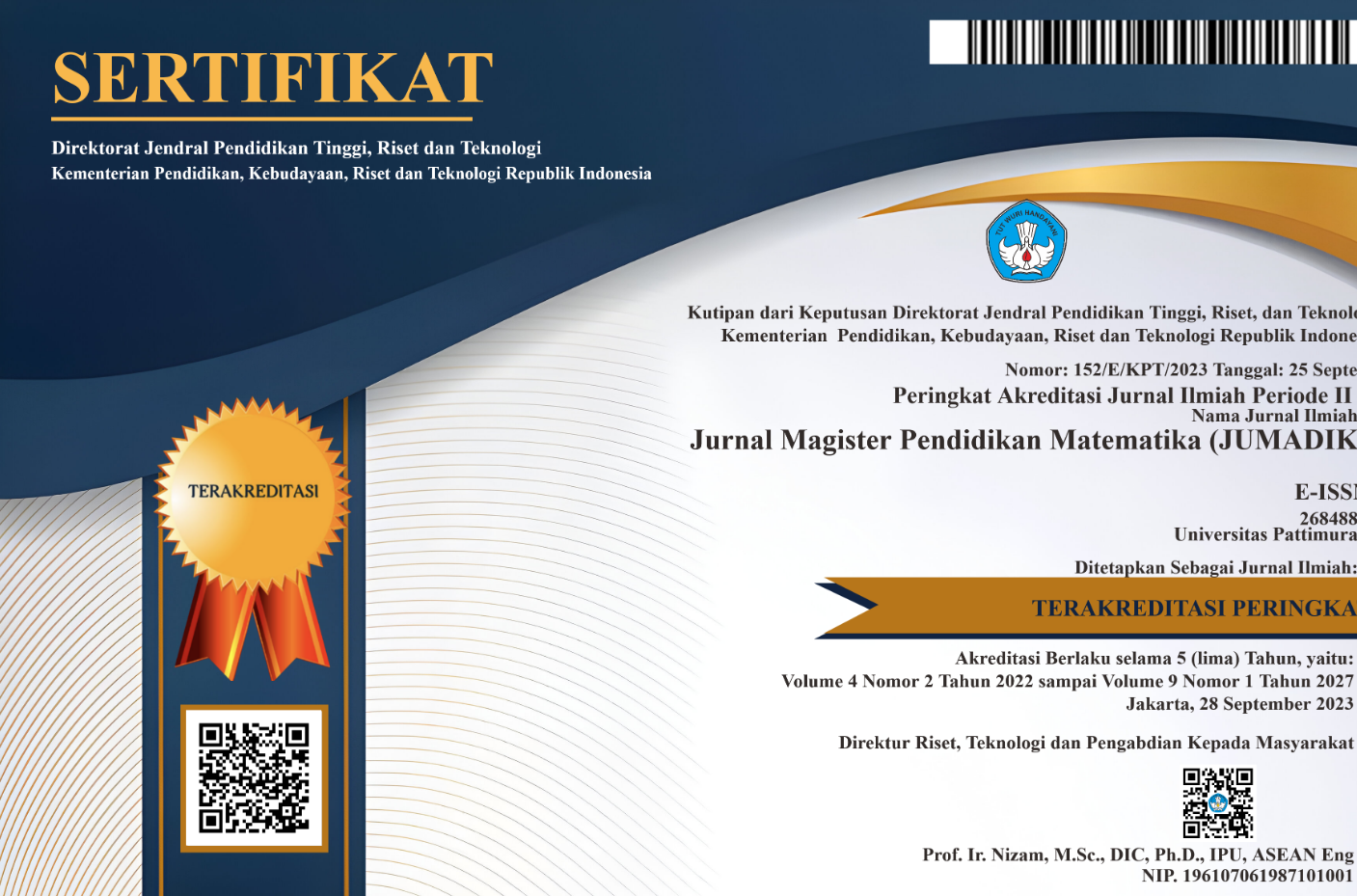KEMAMPUAN PEMECAHAN MASALAH MATEMATIKA BERDASARKAN TEORI POLYA MELALUI PENERAPAN MODEL PEMBELAJARAN KOOPERATIF TIPE TGT
Abstract
Tujuan penelitian ini untuk mengetahui kemampuan pemecahan masalah matematika siswa kelas XI IPA III SMA N 2 Manokwari pada materi penerapan turunan berdasarkan teori Polya melalui penerapan model pembelajaran kooperatif tipe teams games tournament (TGT). Penelitian ini menggunakan metode kualitatif dengan menggunakan teknik deskriptif. Hasil penelitian ini menunjukkan bahwa dalam mengerjakan soal, siswa tidak mengacu kepada teori pemecahan masalah matematika menurut Polya secara sempurna. Terjadinya kelemahan ini disebabkan penerapan model pembelajaran kooperatif tipe TGT mengharuskan siswa mengerjakan soal dengan memanfaatkan waktu seefisien mungkin
Downloads
References
Aini, Novita Nurul, dan Mohammad Mukhlis. (2020) “Analisis Kemampuan Pemecahan Masalah Pada Soal Cerita Matematika Berdasarkan Teori Polya Ditinjau Dari Adversity Quotient”. Jurnal Pendidikan dan Pembelajaran Matematika, 2(1), hlm: 105 – 128.
Hadi, Sutarto, dan Radiyatul (2014), “Metode Pemecahan Masalah Menurut Polya Untuk Mengembangkan Kemampuan Siswa Dalam Pemecahan Masalah Matematis Di Sekolah Menengah Pertama”. Jurnal Pendidikan Matematika, 2(1), hlm: 53 – 61.
Ilela, N. Laamena, Ch, Tamalene, H. 2021. Model Pembelajaran Core, Scramble, Hasil Belajar, dan Operasi Hitung Bentuk Aljabar. Journal of Honai Math. Vol 4 nomor 1. 85-100
Ilmiyana, Miftahul. (2018) “Analisis Kemampuan Pemecahan Masalah Matematika Siswa SMA Ditinjau Dari Tipe Kepribadian Dimensi Myer Briggs Type Indicator (MBTI)”.Skripsi, Universitas Islam Negeri Raden Intan Lampung.
Isrok’atun, dan Rosmala, Amelia (2018). Model-model Pembelajaran Matematika. Bandung: Bumi Aksara.
Laamena, Ch. M. dan Laurens, Th. (2021) Mathematical Literacy Ability and Metacognitive Characteristics Of Mathematics Pre-Service Teacher. Infinity, Journal of Mathematics Education. Vol 10 Nomor 259-270
Lestari, Lesla, dan Deddy Sofyan (2014). “Perbandingan Kemampuan Pemecahan Masalah Siswa dalam Matematika Antara Yang Mendapat Pembelajaran Matematika Realistik (PMR) Dengan Pembelajaran Konvensional”. Jurnal Pendidikan Matematika, 3(2),
Lutfiyah, Nur Iffah. “Analisis Kemampuan Pemecahan Masalah Matematika Berdasarkan Teori Polya Pada Siswa Kelas VIII SMP IT Insan Mulia Manokwari”. Skripsi. Universitas papua: 2020.
Munirah. “Sistem Pendidikan Di Indonesia: Antara Keinginan dan Realita”. Auladuna, 2(2), 2015: 233-245.
Rahmat, Fitriyane L. Apriliani, Suwatno, dan Rasto. “Meningkatkan Pemahaman Konsep Siswa Melalui Teams games Tournament “. Social Science Education Journal, 5(1), 2018: 15 – 23.
Sholihah, Ai. “Pengaruh Model Pembelajaran Teams Games Tournament (TGT) Terhadap Hasil Belajar Matematika. Jurnal SAP, 1(1), 2016: 45 – 53. Bandung: Nusa Media, 2015.
Wattiheluw, Nurlaila, Syafrudin Kaliky, dan Salmiati Ma’aruf (2018). ”Pengaruh Model Pembelajaran Kooperatif Tipe Teams Games Tournament Terhadap Kemampuan Pemecahan Masalah Matematika Pada Materi Matriks Kelas XI SMA Negeri SIWALIMA Ambon”. Prosiding, SEMNAS Matematika & Pendidikan Matematika IAIN Ambon, Ambon: IAIN.
Widyastuti, Rani (2015). “Proses Berpikir Siswa Dalam Menyelesaikan Masalah Matematika berdasakran teori Polya ditinjau dari Adversity Quotient Tipe Climber”. Jurnal Pendidikan Matematika, 6(2)
Copyright (c) 2021 Billy Alexa Bellvian, Haryanto Haryanto, Andi Fajeriani Wyrasti

This work is licensed under a Creative Commons Attribution-NonCommercial-ShareAlike 4.0 International License.
License and Copyright Agreement
In submitting the manuscript to the journal, the authors certify that:
- They are authorized by their co-authors to enter into these arrangements.
- The work described has not been formally published before, except in the form of an abstract or as part of a published lecture, review, thesis, or overlay journal. Please also carefully read Jurnal Magister Pendidikan Matematika (JUMADIKA) Posting Your Article Policy.
- That it is not under consideration for publication elsewhere,
- That its publication has been approved by all the author(s) and by the responsible authorities – tacitly or explicitly – of the institutes where the work has been carried out.
- They secure the right to reproduce any material that has already been published or copyrighted elsewhere.
- They agree to the following license and copyright agreement.
Copyright
Authors who publish with Jurnal Magister Pendidikan Matematika (JUMADIKA) agree to the following terms:
- Authors retain copyright and grant the journal right of first publication with the work simultaneously licensed under a Creative Commons Attribution-NonCommercial-ShareAlike 4.0 International License (http://creativecommons.org/licenses/by-nc-sa/4.0/) that allows others to share the work with an acknowledgment of the work's authorship and initial publication in this journal.
- Authors are able to enter into separate, additional contractual arrangements for the non-exclusive distribution of the journal's published version of the work (e.g., post it to an institutional repository or publish it in a book), with an acknowledgment of its initial publication in this journal.
- Authors are permitted and encouraged to post their work online (e.g., in institutional repositories or on their website) prior to and during the submission process, as it can lead to productive exchanges, as well as earlier and greater citation of published work.








